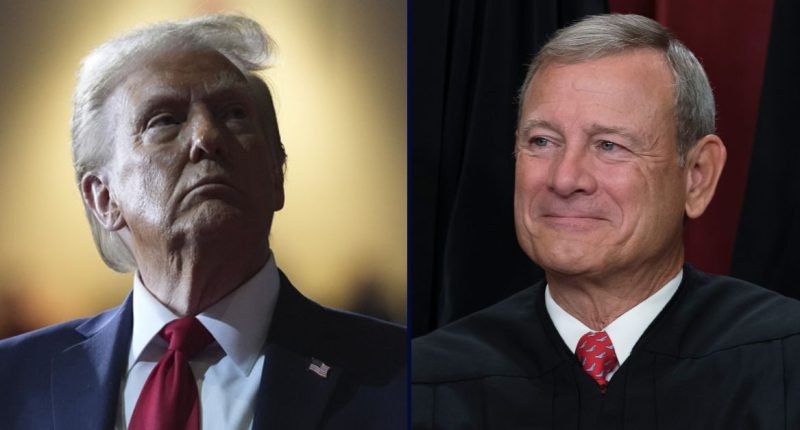Share this @internewscast.com
Left: At a campaign event in Salem, Virginia, on November 2, 2024, then-Republican presidential candidate Donald Trump is seen viewing a screen (AP Photo/Evan Vucci, File). Right: Chief Justice John Roberts, along with other Supreme Court justices, sits for a new group photograph at the Supreme Court in Washington on October 7, 2022 (AP Photo/J. Scott Applewhite, File).
On Friday, Chief Justice John Roberts approved a request from the Trump administration to stop a lower court’s directive mandating that the Department of Government Efficiency (DOGE) release documents as per the Freedom of Information Act (FOIA).
In a brief, single-page order, Roberts provided an administrative hold “pending further order of the undersigned or of the Court.” This effectively halts two discovery orders that had been issued by U.S. District Judge Christopher Cooper, appointed by Barack Obama, in mid-April and earlier this week.
“[T]he district court below ordered [DOGE] to submit to sweeping, intrusive discovery just to determine if [DOGE] is subject to FOIA in the first place,” Solicitor General D. John Sauer wrote in a 38-page emergency application to the nation’s high court on May 21. “That order turns FOIA on its head, effectively giving respondent a win on the merits of its FOIA suit under the guise of figuring out whether FOIA even applies.”
The chief justice’s order halts a planned deposition of titular U.S. DOGE Service Administrator Amy Gleason. The ruling also means DOGE will no longer have to produce documents and answer limited questions posed by the nonpartisan government watchdog group Citizens for Responsibility and Ethics in Washington (CREW).
Love true crime? Sign up for our newsletter, The Law&Crime Docket, to get the latest real-life crime stories delivered right to your inbox.
The underlying lawsuit is an effort by CREW and others to enforce FOIA requests against the Trump administration’s intra-governmental fraud-and-waste-focused organization. DOGE, in turn, has maintained “it is not an agency subject to FOIA.”
Cooper, for his part, has disagreed. The judge issued several rulings directing the pseudo-agency, which refers to itself as a “presidential advisory body within the Executive Office of the President,” to share information with the plaintiffs beginning in March.
Meanwhile, the government has aggressively litigated its preference for DOGE’s inner workings to remain under lock and key.
The Trump administration asked for, and received, an administrative stay of Cooper’s April order from the District of Columbia Circuit Court of Appeals. Later, the appellate court dissolved its own stay and allowed limited discovery to move forward.
On Wednesday, the government reiterated arguments that DOGE “is obviously not an ‘agency’ for FOIA purposes” because its authority is “purely advisory.” Sauer argued various “presidential documents” outline the advisory nature of DOGE’s remit, including directives to “consult” and “coordinate” with government officials on ways to “identify” solutions.
“None of those advisory functions (or functions in support of them) constitute the kind of independent authority that could render a presidential advisory body an ‘agency’ under FOIA,” the application argued.
In its 47-page response to the emergency application, CREW alleged the government made things somewhat topsy-turvy.
“The government’s stay application makes clear that what it is really seeking is not relief from the district court’s narrowly-tailored discovery order, but rather a ruling on the merits of whether the United States DOGE Service, a new component of the Executive Office of the President, is operating as an ‘agency’ subject to the Freedom of Information Act,” the response begins.
The nonprofit argued that instead, the real issue was whether or not the appellate court “erred in refusing to disturb [the] district court order allowing limited discovery to ascertain DOGE’s agency status.”
In other words, both CREW and the government say the merits of the case are being improperly addressed out of turn. The nonprofit says the government hid merit-based arguments within the vehicle of a discovery challenge. Meanwhile, the government says Cooper effectively decided the merits in CREW’s favor by granting discovery.
Roberts, of course, did not opine on the merits whatsoever. But the unequivocal pause on the proceedings, with no indication when or if it will be lifted, counts as a clear win for the Trump administration.
















